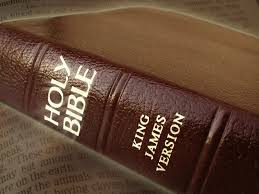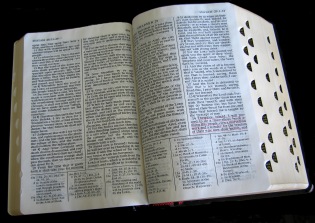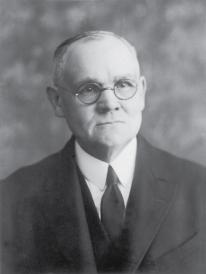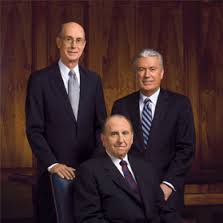
Just as in other churches, Mormons face the question of what to think of the different Bible translations available today. Most churches have a standard text, a pew Bible, but often encourage members to use and explore other translations. Christians have found this very helpful as each translation brings its own strengths and weaknesses. It is also the case that different translations function in different ways as Bible students grow in, share, and teach their faith. You can read here a helpful account of how this works and how we might choose a translation.
For Mormons it is a great deal more difficult yet straight forward in a strange sort of way. The first question a Mormon asks is not, ‘Which Bible translations are reliable?’ but,’What does the church have to say?’ And this is not a simple seeking after counsel, ‘Pastor, which translation would you recommend?’ We all do that from time to time. What is important to a Mormon is, ‘what is the ‘official’ stance of the church?’ It is this that is ‘right’ in the eyes of your typical LDS believer.
This speaks volumes about the degree of trust Mormons put in their leaders. Its fallen out of fashion now, as has so much old fashioned Mormonism, but it used to be proudly said:
“When our leaders speak, the thinking has been done. When they propose a plan — it is God’s plan. When they point the way, there is no other which is safe. When they give direction, it should mark the end of controversy. God works in no other way. To think otherwise, without immediate repentance, may cost one his faith, may destroy his testimony, and leave him a stranger to the Kingdom of God.” (Improvement Era, June 1945)
The (unofficial) Mormon apologetics site FAIR has attempted to refute the idea that this is ‘official’ Mormon thinking, even dragging out from Mormon archives a letter from the Mormon leader George Albert Smith appearing to say as much. You can read it here. But it doesn’t wash because anyone who has dealt with Mormonism, more, anyone who has been a Mormon will tell you this is the attitude of the average True Believing Latter-day Saint to this day. Nothing demonstrates this more than the Mormon approach to Bible translations. Which Bible do Mormons read? The Bible the Mormon leaders tell them to read, because when the prophet speaks the thinking has been done; simple? Well, this is where it gets complicated for them.
Here is the advice of the Mormon Church regarding which version to use, taken from the Institute manual, The Life and Teachings of Jesus Christ and His Apostles, 1979, 2nd. edition, and still currently in use, with comments added.
WHICH VERSION OF THE BIBLE SHOULD I USE?
There are a large number of Bible translations now in existence. The translation recommended for Latter-day Saints has been clarified many times by the Church leaders. The following are examples of such counsel:
“. . . none of these [other] translations surpasses the King James version of the English Bible in beauty of language and spiritual connotation, and probably in faithful adherence to the text available to translators. It is this version which is used by the Church of Jesus Christ of Latter-Day Saints in all of its official work both at home and abroad. The literature of the Church refers invariably to the King James’ translation. Other translations are used by the Church only to help explain obscure passages in the authorized version.”
(Widtsoe, Evidences and Reconciliations, pub.1945, p. 120.)
“This King James or Authorized Version, ‘as far as it is translated correctly,’ has been the version accepted by this Church since it was organized.” (J. Reuben Clark, Jr., in CR, Apr. 1954, p. 38.)
“The Official Bible of our Church is the King James version.” (Editorial, Church News, 14 Nov. 1970, p.16.)
Several things are worth noting:
 First, the editorial from the Church News makes clear that the KJV is ‘the official Bible of the Church.’ For most Mormons, this means the debate is over and the question officially answered.
First, the editorial from the Church News makes clear that the KJV is ‘the official Bible of the Church.’ For most Mormons, this means the debate is over and the question officially answered.
Second, loyalty to the KJV seems founded more on sentiment than scholarship, or spiritual insight. The language is beautiful, who would disagree? ‘Spiritual connotation?’ What does that mean? That the language better conveys the spiritual message underlying the text? If so, why is it that, ‘Other translations are used by the Church…to help explain obscure passages in the authorized version?’
If the spiritual connotations are better conveyed in the KJV what needs explanation? How often I have listened to a sermon delivered from a King James Bible to find the preacher spend half the time explaining the obscurity of the text, rather than delivering the message of the text. In the Mormon Church this is particularly problematic since the other texts they use – Book of Mormon, Doctrine and Covenants, Pearl of Great Price – are written in a pigeon King James language (It truly isn’t the real thing).
Third, the KJV is accepted only, ‘as far as it is translated correctly.’ This is one of the many neat little get-out clauses that pepper Mormonism and comes from the eighth Article of Faith: ‘We believe the Bible to be the word of God, as far as it is translated correctly; we believe the Book of Mormon to be the word of God.’
Fourth, they declare the KJV to be, ‘probably in faithful adherence to the text available to translators.’ They are not even sure it was, but it ‘probably’ was, and only then ‘faithful to the text available.’ Of course, that is the point, surely? ‘…faithful adherence to the text available.’ The KJV just marked its 400th anniversary and textual, historical, archaeological discoveries over 400 years, have given us a wealth of information and sources not available to those translators. Another significant factor is the growing independence of scholars from regal/governmental interference (you really should read the history).
The Mormon Church relies much more on scholarship today than ever it did just fifty years ago. Surely, here is a situation crying out for a rethink on the issue of which Bible translation Mormons use. A problem presents itself, however, in the shape of the inspired authority of church leaders. The manual goes on to state:

This does not mean that the King James Version is a perfect translation. Elder James E. Talmage gave a reason for this when he wrote the following:
“There will be, there can be, no absolutely reliable translation . . . unless it be effected through the gift of translation, as one of the endowments of the Holy Ghost. The translator must have the spirit of the prophet if he would render in another tongue the prophet’s words; and human wisdom alone leads not to that possession.” (Talmage, The Articles of Faith, p. 237.)
So, the Mormons are left with a Bible translation that is beautiful, if obscure enough to need modern translations to help understanding, probably faithful to the text available to translators 400 years ago, but ultimately not an absolutely reliable translation. For that we need a prophet. The manual states:
Such an effort—to translate the Bible scriptures by the power of the Holy Ghost—was begun by the Prophet Joseph Smith under the direction of, and at the command of the Lord. (See D&C 45:60, 61; 93:53.)
The following is instructive information concerning the status of the Inspired Version in the Church today:
“The Inspired Version [as it is called by its publishers] does not supplant the King James Version as the official church version of the Bible, but the explanations and changes made by the Prophet Joseph Smith provide enlightenment and useful commentary on many biblical passages.
“Part of the explanations and changes made by the Prophet Joseph Smith were finally approved before his death; and some of these have been cited in current church instructional materials or may be cited in future church instructional materials.
“Accordingly, these cited portions of the Inspired Version may be used by church writers and teachers, along with the Book of Mormon, Doctrine and Covenants, and Pearl of Great Price, in connection with Biblical interpretations, applying always the divine injunction that ‘whoso is enlightened by the Spirit shall obtain benefit therefrom.’” (D&C 91:5)
“When the Book of Mormon, Doctrine and Covenants, and Pearl of Great Price offer information relative to biblical interpretation, these should be given preference in writing and teaching. But when these sources of latter-day revelation do not provide significant information which is available in the Inspired Version, then this version may be used.” (Editorial, Church News, 7 Dec. 1974, p. 16.)
References from the Inspired Version are used throughout this manual for clarification of particularly vague or faulty passages of the King James Version.
There you have it again, ‘vague or faulty passages of the King James Version.’
The Mormons have an ‘official’ Bible translation that is beautiful, but peppered with particularly vague or faulty passages, indeed, obscure enough to need modern translations to aid understanding. It is probably faithful to the text available to translators 400 years ago, but ultimately not an absolutely reliable translation. They also have a prophet. Now, you might think this last a game changer. Indeed, Joseph Smith did produce his own translation of the Bible, although the official line is that it was never finished. But why would that matter since the current head of the church, Thomas S Monson, is just 16th in a line of prophets stretching back to the founding of the church.
The natural conclusion is that, since the only reliable Bible would have to come from a prophet and, since the Bible they use is vague, faulty, obscure and 400 years old, surely a modern prophet could solve this problem and we could all throw away our NIVs, ESVs, etc. Not so it seems. Since Joseph Smith, the gift of prophecy has increasingly fallen by the way. His successor, Brigham Young, had plenty to say, enough indeed to take a good deal of space in early Mormon periodicals as well as the familiar Journal of Discourses. He didn’t do anything about Bible translation, indeed, he didn’t add more than one section to the increasingly dated and irrelevant Doctrine and Covenants (Section 136).
Subsequent prophets have not even added so much as a pen stroke to the D&C and not one has felt called to finish the Bible translation work begun by Joseph Smith. So what is the true place of the Bible in the Mormon Church?
The official Bible is the King James Version (Americans say King James Version, English believers say King James Bible) but this is vague, faulty, obscure, and 400 years old. Modern translations can be used to aid understanding but none is going to supplant the vague, faulty, obscure, and 400 year old Bible they clarify.
Meanwhile:
“When the Book of Mormon, Doctrine and Covenants, and Pearl of Great Price offer information relative to biblical interpretation, these should be given preference in writing and teaching. But when these sources of latter-day revelation do not provide significant information which is available in the Inspired Version, then this version may be used.”

So, ‘living prophets’ define what is ‘official’ and Mormons give this advice precedence in their choice of Bible. These ‘living prophets’ however cannot produce a more reliable translation than the KJV. In the absence of a better Bible, and with no inclination to look at modern scholarship, the priority in Mormonism is to ‘living prophets’ followed by the Book of Mormon, Doctrine and Covenants, and Pearl of Great Price, only then turning to Joseph Smith’s ‘Inspired Version,’ and last the KJV, which is only to be understood in light of Mormonism, a Mormonism that cannot correct it, though neither can it completely trust it.
I will finish with a personal note to any Mormon who might read this. I congratulate you for reading this far, as I know your instinctive reaction is to dismiss this article as ‘anti-Mormon.’ It is difficult for you to see it in any other way I know. You see, I have sat where you sit now and have felt much as you probably now feel.
I want to ask you to do something if you will. Just for a moment, I want you to get up out of the seat you occupy, the place of outrage that anyone should criticise your church, of suspicion that the motives of people who would do such a thing are bound to be base, vile, and contemptible. I want you to take another seat, the seat of someone who has been invited to join your church and who already has access to, and regularly reads a modern translation of the Bible. This person understands something of how we got our Bible, the process by which it is translated, and the quality and quantity of research material available to modern Bible translators.
Why should this person join your church? Remember you are sitting in their chair now, outside looking in. Especially in light of the what your leaders have said about the ‘official’ church Bible, why should this person join your church?
You have a message of ‘restoration’ and yet have failed to restore the Bible. You have a message of prophets, and yet they have nothing to contribute to modern Bible translation. Your church rejects modern translations on the basis that, ‘The translator must have the spirit of the prophet if he would render in another tongue the prophet’s words; and human wisdom alone leads not to that possession.” (Talmage, The Articles of Faith, p. 237.)
Yet your prophets, so called, who presume to have the spirit of the prophet stand idle while church members use a 400 year old translation that is officially vague, faulty, and obscure, and that needs all the help it can get. Why should this person trust your claims and join your church?
The KJV is not, according to the Mormon narrative, ‘inspired’ since it was put together by intelligent, well-meaning, men who ultimately relied upon the ‘human wisdom’ that Talmage insists would disqualify such a work. You have prophets but they have proved silent on the matter of a better and truly inspired translation. Meanwhile, modern scholarship brings us a wealth of resources to achieve what Mormon prophets seem singularly impotent to do. Even the King James Version has been updated after a fashion, in the NKJV.
Why should this person join your church? Why give up better translations for an outdated and difficult one? Why ‘follow the prophet’ when the prophet seems incapable of lighting the way? Sitting in this chair, on the outside looking in, what does the Mormon Church offer that can have any credibility, let alone attraction, when it sets such a high standard for Bible translation then fails, itself, to meet that standard?
Myself, I have used the NIV for the past thirty years, and have, more recently, found the ESV a great help to serious Bible study. In seeking understanding I consult widely among translations, and have never felt the need to find an ‘official’ Bible. After all, look at where it gets you.
Mike Thomas is the Chairman of Reachout Trust a ministry to the cults in the UK, and this article appeared originally on the Reachout website and in the Reachout newsletter.











To Mike Thomas:
Thank you for this post. However, I am struggling to understand its point. This is not intended to be a criticism, just a “seeking to understand.” Is the point that no one should be using the KJV for bible study because there are more modern examples? Or just that the Mormons shouldn’t be using it?
I have been a Mormon, or member of the Church of Jesus Christ of Latter-day Saints for over 35 years. I have placed myself in the chair of an outside observer, as you ask in your post, many times.
Why has the current or past prophets not provided a more modern translation of the Bible? I don’t know. I haven’t asked. Am I forbidden from using other translations in my studies? Nope. Like you, I have also relied upon the NIV as well as the KJV. Modern scholarship, study and translations are not prohibited by our church. They are welcomed.
Our church is global, covering many countries and many languages. Interestingly, the KJV is not the standard used in every mormon church worldwide. In those countries where the KJV is not the best translated version in that country’s language, a different version is used. The German bible I used on my mission a few decades ago was not the KJV.
One guess on my part as to why the prophets, since Joseph Smith, have not undertaken the challenge to modernize the KJV of the bible is because it is not needed. We have an English version (the KJV) from which to begin our studies, and as you have pointed out, other modern versions also exist for our study, based on modern scholarship. Additionally, in having living prophets and apostles, we have the opportunity to learn the Gospel (or “Good News”) from them twice per year at our semi-annual general conference (as well as countless articles, books, and other meetings). The “Good News” of the Bible is that Christ lives! That He loves us and has provided forgiveness for our sins! That does not need to be re-translated to be understood.
Hello Jared,
Thanks for taking the trouble to come by and read my post and for troubling to respond to it. In my writing I always must allow for the fact that today’s Mormons grew up in/joined a different church to the one in which I spent many years. The taste and texture of the faith has changed considerably over the past thirty years (and I am assuming you are not old enough to have noticed such change so forgive me if I am mistaken)
I also know that the almost universal conservative, reactionary Mormonism of previous generations is being challenged by a more liberal outlook even from within the church these days. It is not, however, the view from this or that individual or generation that we can fairly be expected to address. It is ‘official’ Mormonism, which Mormons still appeal to when cornered about a leader’s statements. If it isn’t in the ‘Standard Works’ it is merely opinion. Thus, we try not to challenge opinion.
You will understand, therefore, that I can only comment on what Mormonism teaches, but recognise that the experience of individuals will be different, as will be the experience of generations. That is why your church leaders and official organs of the church are quoted. I am aware that Mormons are easier today with different translations than was the case thirty years ago and more. The question put concerns the official Bible of the church and not what translation you might pull down from your shelf at home.
Bible scholarship has moved on significantly in the past half century and this has contributed not only to the accuracy of translation, but to our greater understanding of the text. The disconnect between these obvious and reputable advances and the Mormon insistence on using the KJV, of even speaking in its archaic language during the recent conference, is what is being addressed.
You rather oversimplify the issue when you easily appeal to the translations you use, insisting the message is simple in whatever translation. This is somewhat disingenuous, though I am sure not intentionally so. When you say ‘Good News’ and when I say ‘Good News’ you know as well as I do that we mean very different things. The whole point here is that Mormonism is not ‘Good News’ and sticking to a Bible whose language is obscure but sounds like the pidgin King James English of the BOM – indeed of the other books you call scripture – serves to obscure the facts. When I became a Christian it was because someone put a modern Bible (NIV) in my hands and urged me to simply read it without a commentary. Remove the prism (the dark glass) of Mormon dogma and we are no longer saved by grace ‘after all we can do’ but saved by grace – period.
But more than that. These are intelligent, educated men leading your church, so why would they not urge better scholarship, clearer understanding, deeper insight on members? Why is it, indeed, that it is translators in the Christian world who are giving us these things through their scholarship and not these men who claim to wear the mantle of prophet? It is telling, I suggest, that you who follow the counsel of these prophets offer no more than your best guess.
Perhaps you would like to come back to me, taking the post point-by-point and answer it in greater depth than is possible after a cursory reading.
Thank you so much for doing this blog. My husband and I reside in the US and within the last year have felt a calling to witness to mormon missionaries when they come to our door (as I like to say, “If you come to my house unannounced, I’m going to tell you about the real Jesus😉 )
Being as you’ve been on the other side of things, what would you advise we open with when witnessing to the missionaries? We really want to build relationship and show them that we are not evil as they may have been taught.
What is the best approach for witnessing to them?
Thanks so much for this insight.
Hey Lulabelle thanks for the comment, glad you like the article.
Here is an article we have previously done on witnessing to Mormon Missionaries
https://mormonisminvestigated.co.uk/2014/03/31/how-to-witness-to-mormon-missionaries/
Please take a look and I would love to hear any comments or questions you have.
Thanks so much!
Thanks for this. You brought out points that I hadn’t thought of. This will definitely help when we get a visit later this week.